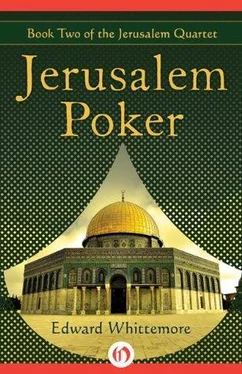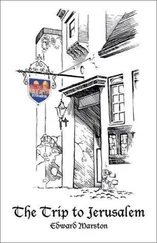There was no other way to see him.
So Joe listened in silence, and after a time Cairo broke through his somber mood.
Anger now, Cairo?
There was.
Vengeance too?
There was.
Well by God, I can see how you've been able to bet all these years without looking at your cards. It's there in the very name you bear.
Given to me by my great-grandmother, a slave from the Sudan. I was going to do it for her and all my people, to repay the Arabs for the black gold they've carried out of Africa over the centuries.
But now you're not so sure that's what you want to be doing?
No. Somehow my passion has been spent along the way. Building something would be better. Perhaps it's because of the game. Perhaps I learned that there.
From our Munk?
From Munk, yes.
I know what you mean. But here now, what's this? Do I see you filling that pipe and preparing a smoke?
You do.
Curious. Never understood the stuff myself. Why would anyone want to bother with that when there's genuine poteen on the premises? A mystery to me, one more among the many. But since we find ourselves taking our ease in our different ways, shouldn't we be talking about our futures? You know how Munk does nothing but deal in futures. Well what about us? Isn't it time we did a little dealing in that line ourselves?
Cairo smiled. Time, he said.
Right. How's that stuff taste by the way?
Good.
Now that's odd, it is. That's exactly how this tastes and poteen is nothing like that at all.
It was dawn before Cairo and Joe embraced on the roof and Cairo made his way across the little stone bridge and down the twisting stone stairs to the street, quiet at that early hour but not deserted, the beggars and madmen and pious fanatics of the Old City already out pursuing their vocations as they had been for millennia.
Cairo walked slowly through the alleys toward the bazaar, thinking he might have something to eat. Soon he would be going back to Africa, he knew that now. He and Joe had talked away the night making their plans, deciding that December 31 would be the appropriate time to play their last hand with Munk, the twelfth anniversary of the game. They had also agreed to make it a surprise to Munk, what they were going to do on that last hand.
But would Munk be surprised? wondered Cairo.
Probably not. They all knew each other too well by now.
Dawn after a long autumn night. Ten years, thought Cairo, after Joe and Theresa had spent their hours of darkness and light together on a rooftop in Jerusalem, and conceived a child.
Did Joe know?
Cairo nodded. Of course Joe knew. No one had told him but he knew. He had admitted as much when describing how Father Zeno had told him that it would be better if he didn't come to see Theresa anymore.
Did he say why? Cairo had asked.
No, answered Joe.
Did you ask him?
No, answered Joe.
And so Joe had known it all these years, a secret borne for the sake of others and never to be spoken, until last night when he had finally shared it with a friend, finally, in his weariness after returning yet again from Aqaba.
And where, wondered Cairo, would Father Zeno have placed the child? With a family? In a foundling home?
In any case, not a religious home. That much was certain. From what Joe had said about Father Zeno, Cairo knew that the gentle old priest would never have presumed to choose a faith for the child. Thus no one but he would ever know who the child really was. Cairo was sure of that.
Father Zeno would have made the arrangements very carefully and the secret would die with him. And somewhere in Jerusalem, or in an encampment near it, a child would grow up not knowing he or she had been born to Christ and Mary Magdalene.
Cairo paused in front of a blind beggar and dropped a copper coin in his cup. Ever since that spring when he had come down the Nile to find the lid on top of Menelik Ziwar's massive sarcophagus, the crinkled smiling face gone, he had never once passed a beggar without giving him something, his way of recalling the kindness an old man had once shown to a frightened twelve-year-old boy, illiterate and without any skills, who had suddenly found himself alone in the world.
The elderly blind man whispered his thanks and Cairo moved on.
Only to stop a few yards away and look back. For a long moment he gazed at the beggar where he sat on the worn stones in the dust, then he retraced his steps and placed three gold coins, one after the other, in the beggar's scarred hand. The beggar heard the coins ring and his blind eyes turned upward. He murmured in disbelief.
Gold?
Yes. I would like you to say a prayer for a child, if you will.
With all my heart. Tell me the name of the child and I will pray.
I don't know the name and I've never seen the child. Or perhaps I have seen the child and don't know it.
In this I am as blind as you.
And so are we all, murmured the beggar. But God knows the names that are and will be for all of us, and I will pray and He will hear my prayer.
Cairo nodded. He placed his hand lightly on the beggar's shoulder and held it there, then turned and entered the bazaar, now raucously coming to life amidst the cries of merchants and thieves hawking their endless goods and trickeries.
But there was yet another secret in that house in the Armenian compound next to the cathedral of St James, unknown even to Father Zeno, a secret Joe had discovered some years after seeking refuge there in 1921, when the old priest had given him the rooftop home where he had learned to dream his Jerusalem dreams.
Early in the nineteenth century, it seemed, a young beggar had turned up at the house one blustery winter night, asking for shelter. The beggar was entirely naked, lacking even a loincloth. He had pretended to be an Armenian although the priest who received him knew he was not. He was given clothes and a blanket and shown to a room.
The next morning the beggar made a proposition. If he were allowed to live in the cellar of the house for the rest of the winter, he would carry out slops and do other menial tasks around the compound. This offer was accepted as an act of charity.
It immediately became apparent the stranger was no ordinary man. Before descending into the cellar that night he explained in a humble yet determined voice that he was under strict self-imposed vows of poverty, celibacy and silence. Save for the omitted vow of obedience, in fact, he might well have been a secret Trappist on some solitary mission.
The priest in the house was skeptical at first, but not when he found the stranger had abandoned the cellar for the even greater deprivation and privacy of a dark basement hole beneath it. Here indeed, then, was one of those anchorites who appeared from time to time in Jerusalem to pursue some personal religious tack in isolation.
The anchorite never spoke again to anyone's knowledge. For the next twelve years he lived in his basement hole beneath the cellar of the house, performing his lowly duties around the compound and coming and going on occasion, but spending most of his time alone in his subterranean cell.
Or so it was assumed. Actually the cellar above his basement hole also had a small entrance that opened directly onto an alley outside the compound, so it would have been possible for him to leave without being witnessed by the priests. And in fact there were years when he wasn't seen by any of them for long periods. Because of the extreme austerity of the anchorite's existence, the priests, with affectionate humor, had come to refer to him among themselves as Brother Zeno, after the founder of Stoicism.
Then in 1836, or when the anchorite appeared to be about thirty, he walked out of the compound one morning with his open hand raised in the sign of peace, turned south at the gate without a word, and was never seen again.
Читать дальше












